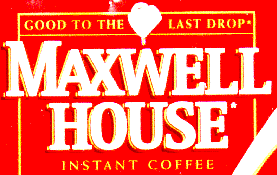|
HOME
DISINFORMATION
JEWISH TAX
Concerning the kosher certification of Maxwell House Coffee Some Maxwell House Coffee consumers might object to a surcharge to support religion added to their grocery bill, particularly when they are not members of that religion, and more particularly when that surcharge is applied without their awareness. Bob Eckert President & CEO Kraft Foods Three Lakes Drive Northfield, IL USA 60093 Bob Eckert: I am writing in connection with the Maxwell House Coffee that I purchased in Vancouver BC displaying the Montreal Vaad Hair kosher-certification logo on its packaging:
Will Kraft Foods offer consumers a kosher-free version of its Maxwell House Coffee? Some Maxwell House Coffee consumers might object to a surcharge to support religion added to their grocery bill, particularly when they are not members of that religion, and more particularly when that surcharge is applied without their awareness. Some consumers might particularly object to kosher certification being the occasion of that surcharge, as it calls to mind the possibility that the surcharge might ultimately be used to support causes of which the consumer disapproves, such as the ethnic cleansing of Palestinians in the Middle East, or the expansion of the Israeli nuclear arsenal, or the support of inhumane methods of slaughter right here in North America. In consideration of such consumers � who possibly greatly outnumber those who observe kosher dietary restrictions � will Kraft Foods offer a kosher-free version of its Maxwell House Coffee? Offering kosher and non-kosher versions for sale side by side would bring two advantages: (1) It would offer Maxwell House Coffee purchasers a choice of paying the Montreal Vaad Hair surcharge or avoiding it. (2) It would permit Maxwell House Coffee for the first time to measure consumer preference. That is, if clearly marked kosher and kosher-free versions of Maxwell House Coffee were sold side by side, then perhaps the effect of kosher labelling on sales could be determined for the first time. Are you in agreement with the desirability of truth in labelling? The meaning of the Montreal Vaad Hair logo is unknown to the vast majority of consumers. Consumers would be better informed if the word "KOSHER" and the Magen David were added to any certification label that Maxwell House Coffee might continue to use, as illustrated below:
Are you in agreement that Maxwell House Coffee is under an obligation to demystify esoteric labelling in this way, or would you hold that Maxwell House Coffee has a right to use its package labelling to pass secret messages to a tiny minority of its consumers? If you feel that the presence of the word "KOSHER" and of the Magen David would lower sales, then does it not follow that the public discovering that the Montreal Vaad Hair logo signifies kosher certification would lower sales for the same reasons? Is Kraft Foods the victim of kosher fraud? I first bring to your attention that the kosher certification of products that do not require kosher certification has been identified by kosher authorities as one of the leading varieties of kosher fraud:
Awareness of the fraud of kosher-certifying products that are exempt from kosher certification is particularly relevant to our discussion, as coffee has been listed as one of the products that is exempt, and that is susceptible to this variety of fraud:
How is Maxwell House Coffee made? I expect that the coffee manufacturing process is an open one, explained in publications available to all, viewable in film documentaries, and accessible to inspection, as for example in public tours of Maxwell House Coffee plants. I wonder if Maxwell House Coffee will offer the same transparency with respect to the kosher-certification component of its manufacturing process? Specifically, how has Maxwell House Coffee production been modified so as to comply with Jewish religious laws? How frequent is rabbinical inspection of Maxwell House Coffee plants, and of what does this inspection consist, and is the nature of this inspection available for viewing on videotape? What are the scientific or engineering qualifications of the rabbinical inspectors? Will anyone step forward to defend the proposition that as a result of rabbinical supervision, Maxwell House Coffee has become purer or more hygienic or more nutritious? Is there anyone who will claim that Maxwell House Coffee is in any detectable way different following kosher certification from what it was before? How much does Maxwell House Coffee pay Montreal Vaad Hair? Could you inform Canadian consumers how much Maxwell House Coffee currently pays Montreal Vaad Hair for the use of its logo, and how much it has paid over its entire period of kosher certification? More information is available For a more detailed discussion of the kosher-certification business, in which additional reasons are proposed for avoiding kosher certification, and in which Maxwell House Coffee is mentioned in several documents, please consult the Ukrainian Archive at: http://www.ukar.org/tax.html Lubomyr Prytulak HOME DISINFORMATION JEWISH TAX |



